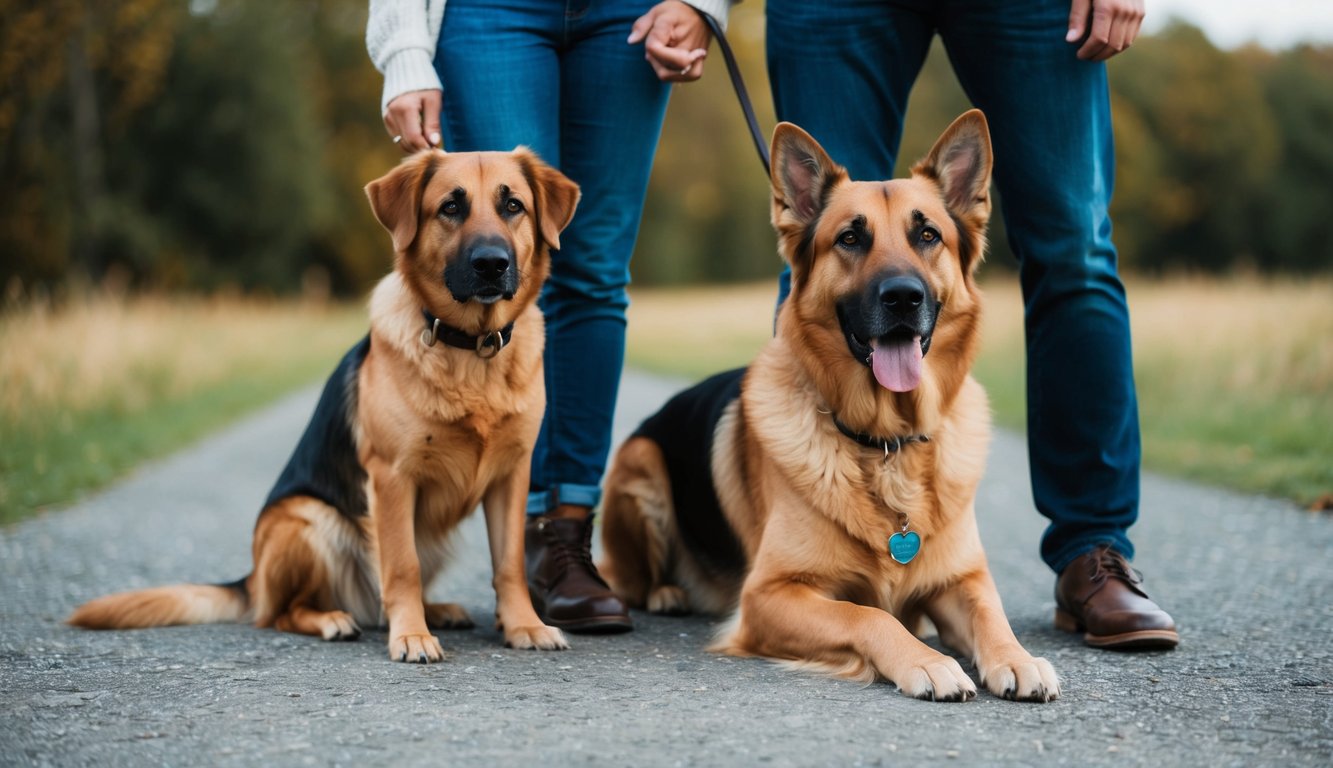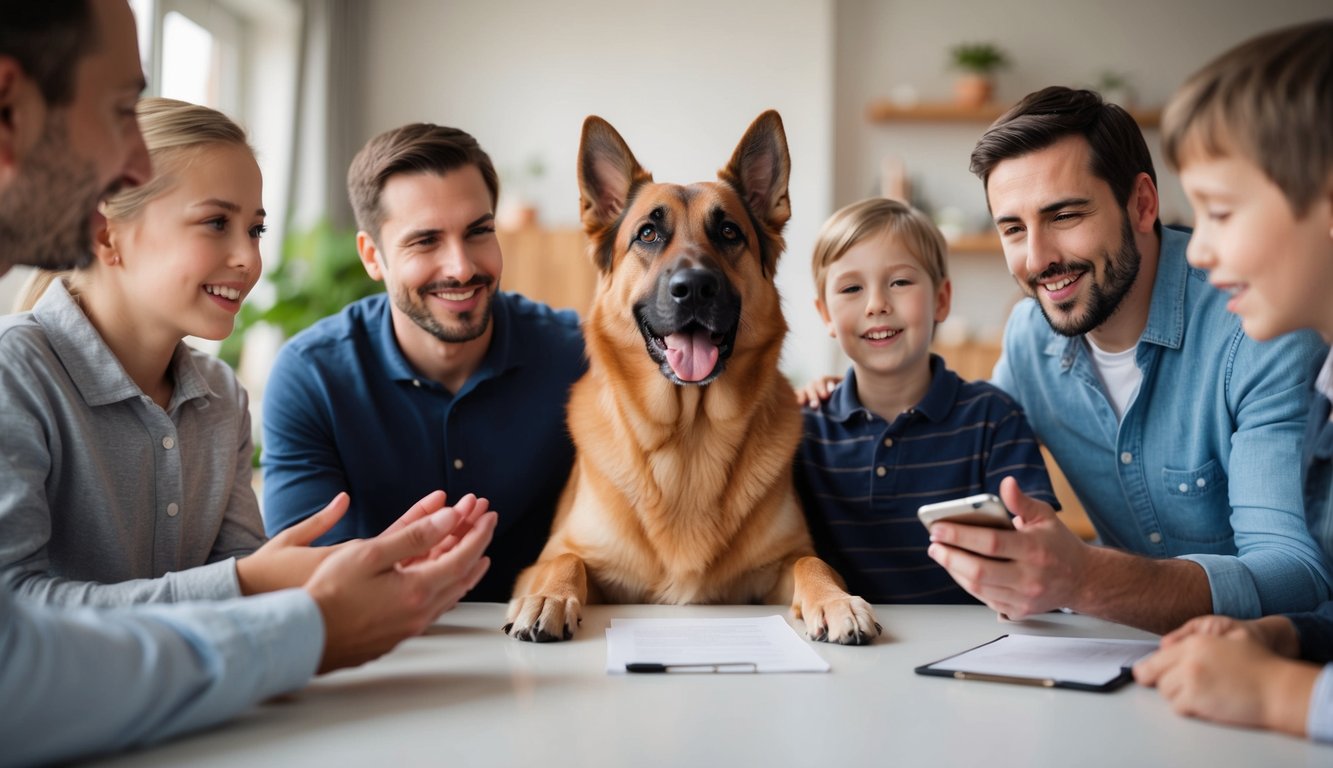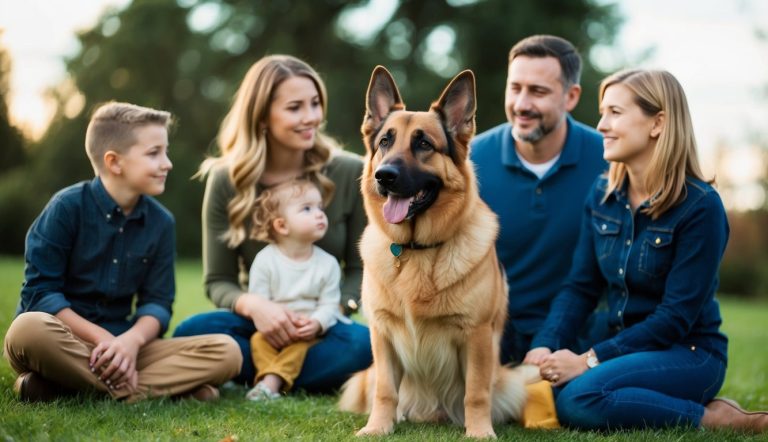The German Shepherd Golden Retriever mix combines two popular breeds to create a large, intelligent dog with a gentle nature. These dogs adapt well to family life and make excellent companions due to their mix of protective and friendly traits. Let’s explore this mix below.
If you’re still on the market to buy a Godlen Retriever German Shepherd mix, PuppySpot currently offers a $300 discount using the code PUPPY300, just click the banner below!
Origin and Recognition
- The Golden Shepherd hybrid emerged as part of the designer dog trend, blending German Shepherd and Golden Retriever bloodlines. This mix is not recognized by major kennel clubs since it’s a hybrid breed.
- The German Shepherd brings its history as a herding and police dog, while the Golden Retriever contributes its background as a hunting and retrieving companion.
- These dogs gained popularity in recent decades as families sought pets with both protective instincts and friendly personalities.
Physical Characteristics
Adult Golden Shepherds weigh between 60-80 pounds and stand 22-26 inches tall at the shoulder. Their coat is typically long and dense, requiring regular grooming.
Common coat colors include:
- Golden brown
- Black and tan
- Cream
- Solid black
The breed often inherits the German Shepherd’s pointed ears and the Golden Retriever’s medium-length coat. Their face usually shows features from both parent breeds.
Temperament and Personality
These dogs make excellent family pets by combining the best traits of both breeds. They show strong loyalty to their families and bond deeply with children.
Key personality traits:
- Intelligence: Quick learners who excel at training
- Protective: Natural watchdog abilities
- Social: Friendly with family and familiar people
- Active: Need regular exercise and mental stimulation
Golden Shepherds typically show less aggression than pure German Shepherds while maintaining alertness. They need consistent training from an early age to manage their high energy levels.

Health and Care for Your Mixed Breed
The German Shepherd Golden Retriever mix needs careful attention to diet, exercise, and preventive healthcare to stay happy and healthy. Regular vet checkups and proper grooming help catch issues early and maintain their wellbeing.
Common Health Issues
- German Shepherd Golden Retriever mixes can inherit health problems from both parent breeds. They have a higher risk of hip and elbow dysplasia due to their size and genetics.
- These dogs may develop eye problems like progressive retinal atrophy or cataracts as they age. Regular eye exams help detect issues early.
- Some mixed breeds face skin allergies and ear infections. Watch for excessive scratching or head shaking.
- Heart problems and bloat can occur in larger dogs. Know the warning signs and contact a vet if the dog shows distress or a swollen belly.
Dietary Recommendations
Feed these active dogs high-quality protein-rich food split into two daily meals. Adult dogs need 3-4 cups of food per day, adjusted based on size and activity level.
Essential nutrients:
- Protein: 25-30%
- Fat: 12-15%
- Glucosamine and chondroitin for joint health
- Omega fatty acids for coat health
Avoid overfeeding to prevent obesity. Fresh water should always be available.
Exercise Requirements
These energetic dogs need at least 60-90 minutes of exercise daily. Break this into multiple sessions to prevent exhaustion.
Daily exercise ideas:
- Morning walk: 30 minutes
- Afternoon fetch or swimming: 20 minutes
- Evening training or play: 20 minutes
Mental stimulation through puzzle toys and training helps prevent boredom and destructive behavior.
Grooming Essentials
Their thick double coat needs regular maintenance to stay healthy. Brush 2-3 times weekly with a slicker brush and undercoat rake.
Basic grooming schedule:
- Daily: Check ears and eyes
- Weekly: Thorough brushing, nail check
- Monthly: Bath, nail trim
- Seasonal: Extra brushing during shedding seasons
Clean ears weekly to prevent infections. Brush teeth 2-3 times weekly to maintain dental health. Their coat sheds year-round, with heavy shedding in spring and fall. Regular brushing helps manage loose fur and prevents matting.
Training and Socialization
Golden Shepherd dogs need early training and plenty of social exposure to become well-behaved family pets. These intelligent and energetic dogs respond well to consistent training methods and thrive on positive interactions with people and other animals.
Training Techniques
Golden Shepherds excel with positive reinforcement training using treats, praise, and toys as rewards. Short, frequent training sessions work best due to their high intelligence and eagerness to learn.
Essential Commands to Master:
- Basic obedience (sit, stay, come)
- Leash walking
- Recall training
- Impulse control
Start training at 8-12 weeks old. Keep sessions fun and engaging, limiting them to 10-15 minutes at a time. These dogs can get bored easily, so vary the training exercises and locations. Mental stimulation through puzzle toys and training games helps prevent destructive behaviors.
Socialization Importance
Early socialization shapes a Golden Shepherd’s future behavior and confidence. Expose puppies to different people, animals, and environments between 3-16 weeks of age.
Key Socialization Areas:
- Children and adults
- Other dogs and pets
- Various environments
- Different sounds and surfaces
Take the puppy to pet-friendly stores, parks, and puppy classes. Make each new experience positive with treats and praise. Proper socialization reduces fear, anxiety, and aggression risks later in life.
Behavioral Traits
Golden Shepherds combine traits from both parent breeds, displaying loyalty, intelligence, and a strong desire to please their owners.
These dogs typically show:
- High energy levels
- Strong protective instincts
- Good problem-solving abilities
- Desire for human companionship
They need regular exercise and mental challenges to stay balanced. A tired Golden Shepherd is more likely to display good behavior at home. Watch for signs of herding behaviors, which may need redirection through training.

Living with a German Shepherd Golden Retriever Mix
The Golden Shepherd mix adapts well to various living situations when given proper attention, exercise, and space. These dogs thrive in homes where they can be active participants in daily family life.
Family Dynamics
- Golden Shepherds make excellent family companions. Their protective instincts from the German Shepherd parent combine with the friendly nature of the Golden Retriever to create a balanced temperament.
- These dogs form strong bonds with children and are typically gentle during playtime. They remain alert to potential threats while maintaining a warm demeanor with family members.
- Proper early socialization helps them interact positively with other pets. Many Golden Shepherds display both watchdog abilities and affectionate traits, making them ideal for families seeking both protection and companionship.
Space Requirements
These large dogs need substantial indoor and outdoor space. A fenced yard provides an ideal environment for exercise and play.
Minimum Space Requirements:
- Yard size: 500+ square feet
- Indoor living area: Enough room to move freely
- Separate sleeping area
- Space for food/water stations
Active Golden Shepherds appreciate having designated play areas. They adapt to apartment living if given adequate daily exercise, but houses with yards are more suitable.
Common Living Situations
Golden Shepherds can adapt to various environments, though some situations work better than others.
Best Living Arrangements:
- Suburban homes with yards
- Rural properties
- Active households
- Families with older children
They do well in homes where someone is present most of the day. These dogs can become anxious or destructive if left alone for long periods. Regular exercise and mental stimulation help them stay calm indoors. A consistent daily routine helps these intelligent dogs feel secure and well-adjusted in their living space.
Frequently Asked Questions
Yes, this mix is known for being loyal, intelligent, and gentle with family members. They usually do very well with children and form strong bonds with their owners, especially when properly trained and socialized. Most adult Golden Shepherds weigh between 60 and 80 pounds and stand about 22 to 26 inches tall at the shoulder. Their size can vary depending on which parent breed they take after more. Yes, they shed year-round and heavily during seasonal changes in spring and fall. Regular brushing several times a week helps manage shedding and keeps their coat healthy. Golden Shepherds are high-energy dogs and need 60–90 minutes of exercise daily. This can include walks, playtime, training sessions, or activities like fetch and swimming. They are generally very easy to train due to their high intelligence and eagerness to please. Positive reinforcement, consistency, and early training work best for this breed mix.1. Are German Shepherd Golden Retriever mixes good family dogs?
2. How big does a German Shepherd Golden Retriever mix get?
3. Do Golden Shepherds shed a lot?
4. How much exercise does this mix need?
5. Are German Shepherd Golden Retriever mixes easy to train?





